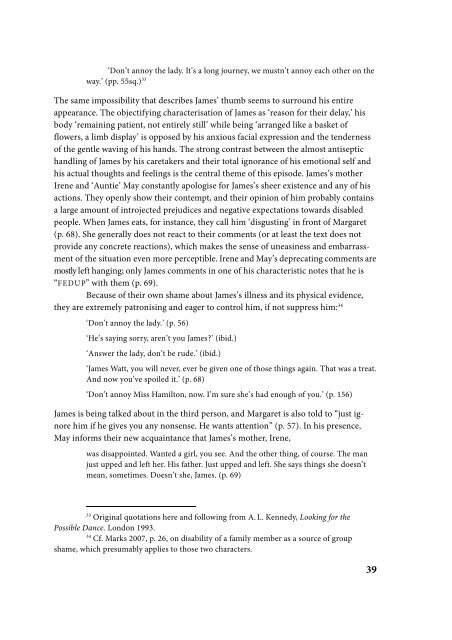Shame as Narrative Strategy - KOPS - Universität Konstanz
Shame as Narrative Strategy - KOPS - Universität Konstanz
Shame as Narrative Strategy - KOPS - Universität Konstanz
Create successful ePaper yourself
Turn your PDF publications into a flip-book with our unique Google optimized e-Paper software.
‘Don’t annoy the lady. It’s a long journey, we mustn’t annoy each other on the<br />
way.’ (pp. 55sq.) 33<br />
The same impossibility that describes James’ thumb seems to surround his entire<br />
appearance. The objectifying characterisation of James <strong>as</strong> ‘re<strong>as</strong>on for their delay,’ his<br />
body ‘remaining patient, not entirely still’ while being ‘arranged like a b<strong>as</strong>ket of<br />
flowers, a limb display’ is opposed by his anxious facial expression and the tenderness<br />
of the gentle waving of his hands. The strong contr<strong>as</strong>t between the almost antiseptic<br />
handling of James by his caretakers and their total ignorance of his emotional self and<br />
his actual thoughts and feelings is the central theme of this episode. James’s mother<br />
Irene and ‘Auntie’ May constantly apologise for James’s sheer existence and any of his<br />
actions. They openly show their contempt, and their opinion of him probably contains<br />
a large amount of introjected prejudices and negative expectations towards disabled<br />
people. When James eats, for instance, they call him ‘disgusting’ in front of Margaret<br />
(p. 68). She generally does not react to their comments (or at le<strong>as</strong>t the text does not<br />
provide any concrete reactions), which makes the sense of une<strong>as</strong>iness and embarr<strong>as</strong>sment<br />
of the situation even more perceptible. Irene and May’s deprecating comments are<br />
mostly left hanging; only James comments in one of his characteristic notes that he is<br />
“FEDUP” with them (p. 69).<br />
Because of their own shame about James’s illness and its physical evidence,<br />
they are extremely patronising and eager to control him, if not suppress him: 34<br />
‘Don’t annoy the lady.’ (p. 56)<br />
‘He’s saying sorry, aren’t you James?’ (ibid.)<br />
‘Answer the lady, don’t be rude.’ (ibid.)<br />
‘James Watt, you will never, ever be given one of those things again. That w<strong>as</strong> a treat.<br />
And now you’ve spoiled it.’ (p. 68)<br />
‘Don’t annoy Miss Hamilton, now. I’m sure she’s had enough of you.’ (p. 156)<br />
James is being talked about in the third person, and Margaret is also told to “just ignore<br />
him if he gives you any nonsense. He wants attention” (p. 57). In his presence,<br />
May informs their new acquaintance that James’s mother, Irene,<br />
w<strong>as</strong> disappointed. Wanted a girl, you see. And the other thing, of course. The man<br />
just upped and left her. His father. Just upped and left. She says things she doesn’t<br />
mean, sometimes. Doesn’t she, James. (p. 69)<br />
33<br />
Original quotations here and following from A. L. Kennedy, Looking for the<br />
Possible Dance. London 1993.<br />
34<br />
Cf. Marks 2007, p. 26, on disability of a family member <strong>as</strong> a source of group<br />
shame, which presumably applies to those two characters.<br />
39

















